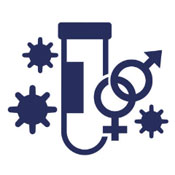STIs & BBVs
STI & BBV Prevention and Testing

Sexually Transmitted Infections (STIs) and Blood-Borne Viruses (BBVs) can affect anyone who is sexually active. Many infections are treatable, and early testing is key to protecting your health and the health of others.
What Are STIs?
STIs are infections passed from one person to another through sexual contact. They can range from mild symptoms to serious health issues if left untreated. Common STIs include:
- Chlamydia
- Gonorrhoea
- Syphilis
- Genital herpes
- Human papillomavirus (HPV)
- HIV (also a BBV)
Some non-STI conditions like Bacterial Vaginosis (BV) and Candida (Thrush) can cause similar symptoms. If you’re unsure, it’s best to get checked.
Gonorrhoea
Gonorrhoea is a common sexually transmitted infection (STI) caused by the bacteria Neisseria gonorrhoeae. It spreads through unprotected vaginal, anal, or oral sex and cannot survive outside the human body.
Symptoms:
- Unusual discharge from the genitals
- Pain or burning when urinating
- Lower abdominal pain (in women)
- Sore throat or rectal discomfort (if infected via oral or anal sex)
Many people, especially women, may have no symptoms. If untreated, gonorrhoea can lead to infertility, pelvic inflammatory disease, and eye infections in newborns.
Testing & Treatment:
Get tested at a GP or sexual health clinic if you’ve had unprotected sex or notice symptoms. Diagnosis is via urine or swab tests. Treatment is fast and effective with antibiotics. Avoid sexual contact until cleared by your doctor.
Prevention Tips:
- Use condoms correctly
- Get regular STI checks
- Avoid contact with symptomatic partners
- Notify sexual partners if diagnosed (your clinic can assist confidentially)
Syphilis (Pox)
Syphilis is a serious sexually transmitted infection (STI) caused by the bacteria Treponema pallidum. It spreads through unprotected vaginal, anal, or oral sex and can also be passed from mother to baby during pregnancy. If left untreated, syphilis can cause long-term damage to the heart, brain, and nervous system.
Symptoms:
Syphilis progresses in stages, each with different symptoms:
- Primary stage: A painless sore (chancre) appears at the site of infection – genitals, mouth, or rectum – typically 10 days to 3 weeks after exposure. Swollen groin glands may also occur.
- Secondary stage: A rash may develop on the body, especially on the palms and soles. Other symptoms include mouth ulcers, sore throat, headache, and fever.
- Latent stage: No visible symptoms, but the infection remains in the body.
- Tertiary stage: Years later, untreated syphilis can damage the heart, brain, and nerves, potentially leading to serious illness or death.
Many people, especially women, may not notice symptoms. Regular testing is essential.
Testing & Treatment:
Syphilis is diagnosed through a blood test or swab. Treatment involves antibiotics, usually penicillin. Early treatment leads to a full recovery, but damage from late-stage syphilis may be irreversible.
Follow-up testing for up to two years is recommended to confirm the infection is cured. Avoid sexual contact until your doctor confirms it’s safe.
Pregnancy:
Untreated syphilis during pregnancy can infect the baby, leading to congenital syphilis, miscarriage, or birth complications. All pregnant individuals should be tested early and treated if necessary.
Prevention Tips:
- Use condoms correctly during all sexual activity
- Get regular STI checks
- Avoid contact with partners showing symptoms
- Inform sexual partners if diagnosed (your clinic can assist confidentially)
Genital herpes
Genital herpes is a viral STI caused by the herpes simplex virus (HSV), transmitted through vaginal, anal, or oral sex. It commonly affects the genitals, anus, and nearby skin.
Symptoms:
- Painful blisters or sores (initial outbreak)
- Itching or tingling with smaller blisters during recurrences
- Sores usually heal within 7 – 10 days
- May have no visible symptoms
Diagnosis & Treatment:
Confirmed through a swab or clinical exam. Antiviral medication can ease symptoms and reduce recurrences, but there is no cure. Treatment helps lower transmission risk.
Prevention:
Avoid sex during outbreaks, use condoms consistently, and consider suppressive therapy if outbreaks are frequent.
Chlamydia
Chlamydia is a common sexually transmitted infection (STI) that often shows no symptoms, especially in women. If left untreated, it can lead to serious complications such as infertility, pelvic inflammatory disease (PID), and ectopic pregnancy.
Symptoms:
- Painful urination and watery discharge (in men)
- Vaginal discharge, pelvic pain, itching, and bleeding between periods (in women)
- Many people have no symptoms at all
Chlamydia can also be passed from mother to baby during childbirth, potentially causing eye or lung infections in newborns.
Testing & Treatment:
Chlamydia is diagnosed through a urine or swab test. It’s easily treated with antibiotics. Early treatment prevents long-term damage, but infertility caused by untreated infection cannot be reversed.
Prevention:
- Use condoms or diaphragms during sex
- Get regular STI checks if sexually active
- Notify sexual partners if diagnosed so they can be tested and treated
What is PID
Pelvic Inflammatory Disease (PID)
PID is a serious reproductive health condition caused by untreated STIs like Chlamydia and Gonorrhoea. It can lead to infertility, chronic pelvic pain, and ectopic pregnancy.
Symptoms:
- Tingling or burning when urinating
- Abnormal vaginal discharge
- Lower abdominal pain or tenderness
- Pain during sex
- Irregular periods or fever
- Some women may have no symptoms at all
Testing & Treatment:
PID is diagnosed by a doctor and treated with antibiotics. Severe cases may require hospital care. Early treatment helps prevent long-term damage.
Prevention:
- Use condoms consistently
- Limit sexual partners
- Communicate openly with partners
- Get regular sexual health check-ups
HIV and AIDS
HIV (Human Immunodeficiency Virus) is a virus that weakens the immune system, making it harder to fight infections. If untreated, it can progress to AIDS (Acquired Immune Deficiency Syndrome), a life-threatening condition.
How HIV Spreads:
- Unprotected vaginal, anal, or oral sex
- Sharing needles or syringes
- Unsterile tattooing or piercing equipment
- Rarely, through blood transfusions (due to modern screening)
Symptoms & Testing:
Many people with HIV show no symptoms for years. A blood test is the only way to confirm infection. Early diagnosis allows for timely treatment and reduces transmission risk.
Treatment:
There is no cure, but antiretroviral therapy (ART) can manage the virus and help people live long, healthy lives. Treatment must be taken consistently.
Prevention Tips:
- Use condoms during sex
- Don’t share needles
- Get tested regularly
- Talk openly with partners about sexual health
- Ensure sterile equipment for tattoos or piercings
For more information, visit NT AIDS & Hepatitis Council or the CDC’s HIV page.
Other STIs & Conditions
NGU (Non-Gonococcal Urethritis)
A sexually transmitted infection causing discharge and burning during urination in men. Women may carry infections that trigger NGU in male partners. Diagnosis requires a doctor. It’s treatable with antibiotics but may recur. Avoid alcohol and sex during treatment.
Trichomonas
A common STI caused by a parasite. Women may experience frothy, smelly discharge and pain during sex or urination. Men may carry it without symptoms. Treated with antibiotics. Learn more from the CDC’s Trichomoniasis page.
Thrush (Candida)
A fungal infection affecting both sexes. Women may have itching, redness, and white discharge; men may have mild inflammation. Often triggered by antibiotics, diabetes, pregnancy, or hormonal changes. Easily treated with antifungal medication.
Hepatitis B
A viral liver infection spread through blood and body fluids, including sexual contact. Symptoms include fatigue, fever, and jaundice. It can become chronic and lead to liver damage. A vaccine is available. For details, visit NT AIDS & Hepatitis Council.
Bacterial Vaginosis (BV)
An imbalance of vaginal bacteria causing strong-smelling discharge, itching, and discomfort during sex. Treated with antibiotics or vaginal creams.
Genital Warts
Caused by HPV and spread through sexual contact. Warts may appear 1–6 months after exposure. They can increase cervical cancer risk, so regular Pap smears are recommended. Learn more from the CDC’s Genital Warts page.
Pubic Lice & Scabies
Spread through close contact or shared bedding.
- Pubic lice cause itching and are visible in pubic hair. Treated with creams, no need to shave.
- Scabies is caused by mites burrowing into the skin. Treat all household members and wash bedding thoroughly.
Signs & Symptoms
Many STIs show no symptoms, especially in women. However, you should seek testing if you notice:
- Unusual discharge from the genitals
- Burning or pain when urinating
- Sores or ulcers near the genitals
- A non-itchy rash, especially on the hands or feet
Even if symptoms disappear, the infection may still be present. Regular check-ups are important if you’re sexually active.
Why Get Tested?
- STIs can be present without symptoms
- Early treatment prevents complications and transmission
- Testing is quick, confidential, and often free
If you’ve had unprotected sex or multiple partners, regular STI screening is recommended.
Preventing STIs
The most effective way to reduce the risk of STIs is to use condoms correctly during vaginal, anal, or oral sex. Condoms help protect against many STIs and BBVs.
Other prevention tips:
- Don’t share needles or personal items that may carry blood
- Avoid sexual contact with anyone showing symptoms
- Get vaccinated for HPV and hepatitis B if eligible
Telling Partners
If you’re diagnosed with an STI, it’s important to inform current and past sexual partners so they can get tested and treated. If you’re uncomfortable doing this yourself, your healthcare provider can help notify them confidentially.
